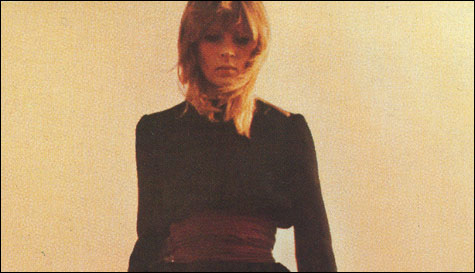
POST-VELVETS: The solo Nico ignored the oncoming ’70s, looking behind. to plainchant and folklore, and beyond to the marmoreal chill of Joy Division. |
There may have existed another woman in the ’60s able to claim Brian Jones, Bob Dylan, Jim Morrison, Jimi Hendrix, Lou Reed, and Iggy Pop as lovers, but she can’t have been as interesting as Nico. As a consort of the elite, Nico ruled them all. For a time she had little Leonard Cohen crouched somber-eyed at her side, feeding her macrobiotic tidbits, but he never had his way with her. It made him feel like Berlin: “Hungry as an archway/Through which the troops have passed,” he wrote in “Take This Longing,” “I stand in ruins behind you.” Her beauty was damaging — beauty, in the words of Yeats, “to make a stranger’s eye distraught.”
And then there was her voice: that tolling, not-to-be-resisted voice, so at home in the mediæval depth of the Velvet Underground’s “All Tomorrow’s Parties” that the music — guitar scratch, slaveship drums, and John Cale’s piano doing its Black Angel boogie-woogie on top — is unimaginable without it. A dominatrix contralto, with vowel sounds as cold and monumental as the Brandenburg Gate: “And whaaat will she do with Thursday’s raaaags when Monday comes a-roooound.” You’d laugh if the hairs on the back of your neck weren’t standing so respectfully to attention. It was the perfect song for Nico, for this frowning German cover girl who had fetched up in the Warhol circle after modeling in Paris, acting in a Fellini movie (La dolce vita) in Rome, and dabbling at a pop career in Swinging London. Lou Reed’s lyric sketched the meltdown of a Manhattan debutante, but in shapes that seemed to echo out of Central European folk memory: “A blackened shroud, a hand-me-down gown/Of rags and silks, a costume/Fit for one who sits and cries/For all tomorrow’s PAAAR-TIES.” It was Truman Capote by way of the Brothers Grimm, and it would ricochet through her life like a prophecy.
Rhino Records has gathered and remastered two of Nico’s albums, The Marble Index and Desertshore, into one package: The Frozen Borderline: 1968-1970. Together they add up to one of the more astonishing artistic statements of the 20th century. For a shock, go straight to “Janitor of Lunacy,” the first track on Desertshore: over a hubble-bubble of harmonium the voice comes in like the stroke of an ax — keening, atavistic, ageless. The junkie chamber music of her post-Velvets album Chelsea Girls, on which all the songs were written by her boyfriends (Dylan, Reed, Jackson Browne), is centuries away. The Frozen Borderline is pure Nico: the woman herself.
There were men involved, of course. Solitude, drugs, and men were her three elements. Permission to create, she said, was given by her “soul brother” Jim Morrison: they did peyote together in the desert outside LA, sliced open their thumbs and swapped blood, and somewhere between the cactus visions and the readings of Blake and Coleridge he succeeded in empowering her as a songwriter. She got hold of the harmonium that would accompany her thereafter like a witch’s familiar and taught herself how to play it, grinding and creaking away on this little engine of bad vibes. She confined herself to a candle-lit room and wrote lyrics, half poems, in which the Romantics to whom Morrison had introduced her were refracted through a strange, glassy language: “Symbols captured in a traaaance/Vanish from my glaaaance.” And then she took it all to John Cale.